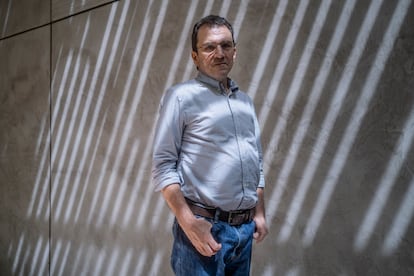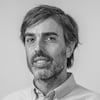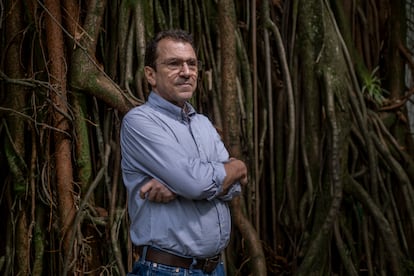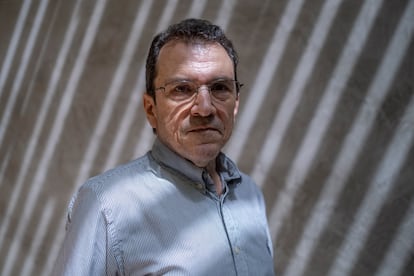Alonso Salazar, Colombian journalist: ‘If Pablo Escobar had possessed an atomic bomb, he would have dropped it on us’
The writer of ‘The Parable of Pablo,’ the reference book on the life of the famous drug trafficker, discusses Escobar on the 30th anniversary of his death


In the era of instant communications, Alonso Salazar, 63, doesn’t answer his phone for days. He’s rarely seen around Medellín and he gives few interviews. There’s something mysterious about this journalist. He became mayor of the city in 2008. And, when he ran for re-election in 2012, he lost. This defeat rid him of his desire to socialize excessively. For years, he has refused to say a word about members of the Medellín Cartel. However, the ghost of Pablo Escobar haunts him… and it will likely haunt him forever. More than two decades ago, he wrote the reference book on the infamous drug lord, The Parable of Pablo, which has become a classic of Colombian literature. The series and podcasts that have been made about the most universal gangster have been based on this work.
On a sunny morning in a modern cafe — where they also sell Chemex coffee makers and tote bags — he seems relaxed and talkative, contrary to the reputation that precedes him. Five minutes after we conclude the interview, I call him on his phone to ask a question that I forgot to ask. But Salazar doesn’t respond… the fog has swallowed him up again.
Question. It has been 30 years since the death of Pablo Escobar. How did he transform Colombian society?
Answer. We entered into a violent modernization. He suddenly introduced us to an issue of extraordinary urban violence — the one he generated — but also the one that was woven around narco culture. It was a massive phenomenon, which influenced the popular classes and also the middle classes. Drug-trafficking is a very redistributive business — it gives opportunities to many people. A very illegal, very usurious, very extreme mentality took hold here. Medellín was the first place where this was very visible and, later, it permeated other regions of Colombia. Today, I see it as having been the preview of what became a global phenomenon.
Q. Why does the Escobar myth persist 30 years later?
A. Unlike Al Capone or Bonnie and Clyde, globalization was [part of his time]. Since 1984, whatever he did was reported to the entire world every day. He was also extremely violent, which helps him stand out on the internet from the rest of the gangsters. And it’s not at all common for a criminal to challenge a state and submit it.
Q. Are you uncomfortable with the cult that surrounds Escobar?
A. Not at all. I think he’s a ghost… and it’s useless to fight with ghosts. I think there are some ideas that have been built around that [ghost]. For instance, all the narco TV series and books. The reality is that all the worst stuff happened before any series or book. [Only after the violence] came the process of seduction [that the character provokes].
A typical example is the Pablo Escobar neighborhood [in Medellín]. When you went there a few years ago, you would find the occasional family that had a little altar in his honor. And now, you go and find a mural of him at the entrance and a souvenir shop. He’s now a business. There’s a tourism and marketing phenomenon around Escobar… his [brother] tried to patent Pablo Escobar and [the authorities] told him no, that he was crazy. My reasoning is that if we all suffered because of him, he’s part of everyone’s heritage.
Q. You were mayor of Medellín between 2008 and 2012. Was the city still under Escobar’s spell during your tenure?
A. Without a doubt. What happened in Medellín after Escobar’s death is that Los Pepes (a paramilitary group created to assassinate Escobar) inherited criminal control over the city. The authorities gave total impunity to the Castaño brothers — who went to open the paramilitary fronts — and to Don Berna (a prolific drug lord), who was left managing the crime in this city. Something called “The Office” was created, a structure of truly organized crime. I had to [reintegrate] that paramilitarism… but that [integration] was a farce. They continued to commit a lot of crimes. Until there’s institutional stability and minimal state control over the national territory, these ghosts will grow and multiply very easily.
Q. You’ve spent many hours thinking about Escobar. What psychological portrait do you make of him?
A. His wife, Victoria Eugenia Henao, has published a book in which she calls him a psychopath and says that he was an abuser. Victoria Eugenia’s story also reveals that she didn’t have a peaceful domestic life.
Q. She concludes that he wasn’t a good father, contrary to what is usually thought about him…
A. He wasn’t. Everyone who lived with him says that he declared a lot of love, but that he didn’t really think about [his loved ones]. He had the opportunity to submit to justice and he never did it... that put his family at risk.
Q. He became the richest man in the world, but he never felt accepted. There was a kind of anxious desire in him to become part of the country’s elite.
A. He was a character who wanted to appear [in public] a lot. That’s why he had a newspaper, Medellín Cívico, and why he had someone write his speeches when he was a public figure. He wasn’t a good speaker and he knew it. He took a chaplain with him everywhere as a spiritual advisor, who gave him blessings. He set up the first regional television programming company that existed in Colombia. He was clear about his agenda and what he wanted to do. The crazy idea occurred to him that — even with his criminal record — he could become president.
Q. What prevented him from becoming president of Colombia?
A. He began to take steps towards the presidency. The first ones were easy, like being a councilor for Envigado (a municipality southeast of Medellín) and feeling like the lord and king there. But then came the election to [Congress] and his support for candidate Luis Carlos Galán [during the 1982 presidential elections]. It’s strange, because he supported the most moralistic of the candidates. Galán’s Civic Movement was anti-narcotics, because many of its activists had died on the Atlantic coast, murdered by marijuana traffickers. When they found out that Escobar was supporting them, alarm bells went off: they decided to exclude him very quickly. They did it at a public event in Medellín: it was like a public excommunication. This unleashed long-term anger. Escobar never forgave that. He ended up having Galán killed [in 1989].
Q. He was a man without scruples. What were his moral limits?
A. He had no limits. If he had had an atomic bomb, he would have dropped it on us.
Q. What was Escobar like as a young man, when he used to steal tombstones and resell them?
A. He was never a good student. Intelligent, yes, but his academic achievements weren’t good. He began to invest a lot of time buying and selling contraband cigarettes. He bought a motorcycle and smuggled [packs] with his cousin, who was his partner for the rest of his life, Gustavo Gaviria.
I think Pablo rose quickly because he decided to be an assassin. At that time, there was something that was known as the Marlboro War. That was his first school: his first job as a hitman. He did it in such a crude way that he gained recognition. When he started with the first kilos of cocaine, he already had a reputation as a thug. The other drug traffickers looked at him with respect. He became superior to them because of his capacity for extermination. He kept them subdued and scared for the rest of their lives.

Q. How important was his mother, Hermilda Gaviria, in his development? How did she shape him as a child and influence him as an adult? Was it a toxic relationship, as they now say?
A. It was a very Oedipal relationship, with all the consequences that this brings. [Someone with this complex] tends to not respect any rules, they don’t internalize the law. There was a maternal and cultural tolerance for crime… a system of justifications. Several members of Pablo’s family, such as his wife and mother-in-law, distanced themselves from him. Doña Hermilda, on the other hand, always justified whatever he did.
Q. Does the fact that he didn’t have a father figure have anything to do with this lack of values?
A. His father was invisible, non-existent in some ways. The old man intentionally left Pablo Escobar’s influence. He only agreed to have a medium-sized farm with some livestock. The man was serene, the neighborhood’s night watchman. Doña Hermilda was a school teacher. The father was low profile, silent, rather shy… unlike her, who had leadership skills.
I don’t know when the father leaves [the family]. I imagine it was when [he got ahold of] a piece of land. He lived without any luxuries. He had a humble home, he didn’t frequent society or [visit] his family. I’m not a psychoanalyst, but I learned that the father is very important to break an Oedipus complex. The absence of a father and [the presence of a] doting mother are very noticeable.
Q. Escobar rose quickly and managed to make contacts in Cuba, in Panama. Was he the trafficker who sent the most cocaine to the United States?
A. At first, he and his cousin went to Bolivia to buy coca so they could export it. Then, they learned to cook [cocaine in a lab]. At first, several drug traffickers joined together to make shipments. Then, Escobar added a new element: he insured the shipments. If they were confiscated [by the authorities], he would still pay [the traffickers]. Probably in terms of volume, the man who moved the most cocaine for him was Carlos Lehder (a member of the Medellín cartel and admirer of Hitler, he was arrested in 1987 and served a 34-year prison sentence in the United States).
Q. It’s often said that Escobar was a man of the left. How much truth is there in this?
A. He showed signs of being leftist. He studied at the Liceo Antioqueño, [a school where there was] revolutionary agitation, anti-imperialist, anti-oligarchic rhetoric, which resonated with him throughout his life. Then, he put some of that spice into his speeches. It’s true that he had good relations with the M-19 (a guerrilla group that President Gustavo Petro was once a part of)... he liked being with fighters. I think he supported the takeover of the Palace of Justice by the M-19 [in 1985]. But at some point, he was no longer interested in left or right, [he only cared about] his own power.
Q. He was a very neat man. He brushed his teeth for an hour; he cut his hair daily.
A. That’s another characteristic of psychopaths: narcissism. He was a very narcissistic guy: [he thought his hair] was very pretty and he was always combing it.
Q. He wasn’t a man of intellectual depth.
A. But he had a lot of natural intelligence. He handled quite broad levels of information and sought to know everything. If you read the prologue he authored in a book of his political cartoons, he understood the subject of drugs and the roots of prohibitionism. He was aware that only legalization could put an end to the business. He gave a lot of lectures to his lawyers… something that was useless, because he ended up killing the judges. In that respect, he was an anxious guy. He wanted to have the full picture of things.

Q. An aspect of him that isn’t so well known is that he dedicated himself to extorting other drug traffickers, both friends and enemies. He collected the ransom from the family… but then he killed the kidnapped person and stole all of their property. Was he doing it for money, or was there a hidden pleasure in kidnapping and killing, in managing the lives of others, as if he were God?
A. The greatest example of that was the death of the Pablos. Pablo Correa, a drug trafficker, asked [Escobar] to kill another Pablo Correa, a sports leader, so as to simulate his own death. Escobar did it and charged him for the murder… but it wasn’t long until he also murdered the drug trafficker, to keep all of his assets.
Escobar also murdered a pilot’s friend in this way. The pilot investigated until he discovered that Escobar was responsible. From that moment on, there was a war began between them. I spoke with the pilot and he told me that he had a plan to bomb La Catedral (the prison where Escobar was held for a time) from the air, with canteens of dynamite dropped from a plane. He wasn’t able to do it.
Q. Speaking of La Catedral: it’s a unique fact in history that the state allows a gangster to build his own prison.
A. Words fall short to describe the farce that was La Catedral. He was able to select the guards, all people from Envigado recruited by him. He corrupted the army that made up the second security ring, as well as the officials who were supposed to guard the prison. There’s all this talk about how he escaped La Catedral… no, Pablo simply left through the door.
Q. You’ve written extensively about the world of young criminals. Does the phenomenon of children committing assassinations arise indirectly because of Escobar?
A. Yes. In the environment where many [gangsters] grew up, the detachment from life was relatively normal. Escobar’s power was in that he governed bold and intrepid people, who had no limits.
Q. In his book about Escobar, one expert defines these child assassins as sociopaths.
A. Just as some turn to the convent, others turn to crime. Escobar had the ability to attract young people with that potential. They were [orphaned] children, very socially precarious, who were seduced by money.
Q. Can the birth of paramilitarism in Colombia also be attributed to Escobar?
A. Birth yes, but the spread, no. He created the Death to Kidnappers (MAS) movement when the kidnapping of the daughter of the Ochoas (a family of drug traffickers, Escobar’s associates) occurred. Escobar, the Ochoa brothers and Carlos Lehder set out to rescue her with a big group of hitmen, police and soldiers, who detained people and took them to industrial warehouses, where they tortured and killed them to obtain information. The MAS later spread throughout the country. President López Michelsen once said that this wasn’t an organization, but a social movement. The alliance between drug traffickers and ranchers then began to spread throughout the country to confront the guerrillas.
Q. To put an end to Escobar, the Search Block was created, a special operations unit composed of police and military officials. Drug traffickers who had a rivalry with Pablo also collaborated with this group. How long did the hunt last?
A. It lasted a few months. The Castaños (two brothers who were paramilitary leaders) began to run things. Historically, they had a lot of ties with the Armed Forces. They had the capacity to set up a militia. This was added to the war that Escobar had with the Cali Cartel, since he didn’t want to negotiate with them. All of them joined together and used the same tools that Escobar deployed to search for him: murdering and torturing people, persecuting his family, dynamiting his properties. The death of El Chopo (Mario Alberto Castaño Molina), Escobar’s key hitman, was fundamental. They caught him because one of his boyfriends ratted him out. Many of Pablo’s cronies were bisexual. Many of them ran to surrender to the authorities, for fear of being killed.
Q. Escobar always refused to surrender.
A. Always. He began to really suffer, because he had never really suffered before, having to crawl along roads and go down mountains. Around that time, they were already able to track his communications. He decided not to leave the urban area again.
There’s a hero from the fight against Pablo Escobar who has already died; he was the one who located him. It was Lieutenant Martínez Bolívar. He was a young guy who was given an interception system that no one knew how to use. He spent a year playing around with it. He was the one who gave the exact location of where Escobar was hiding.
Q. At that point, Escobar had lost his army. He was simply escorted by a hitman named Limón and a cousin, Luzmila.
A. He was condemned to solitary confinement. [Escobar] had a strong mental deterioration.
Q. And a physical one, too. He gained a lot of weight.
A. He lost his grace and he lost track of reality. It reminds me of Hitler’s final stage. Faced with truly adverse circumstances, he didn’t have much ability to make correct decisions. The siege was brutal, especially against his own family. He had no way out at that time… the last resort he said that he had was to go to the ELN’s territory (the National Liberation Army, a left-wing insurgency group). But he knew that he had no chance, because they weren’t going to let him live, either.
Q. He ended up fleeing through the roof of a house when he was surrounded.
A. He was in that house for 15 or 20 days. That house had a front that overlooked a ravine in the Los Olivos district [of Medellín]. It had a rear window and a side window. It’s very silly to think that there could have been an escape plan in place… surrounding that house was very easy. The only thing that could have saved him was to not be detected. But once detected, there was no way to escape. They surrounded him quickly.
Q. Several people claim to have given Pablo the final shot.
A. Hugo Aguilar, the paramilitary who later became governor of [the region of] Santander, says it was him. But [the drug lord] Don Berna says that Aguilar wasn’t there at the time, that he had gone off to lunch. Don Berna says that it was a cousin of his who they call Semilla (“seed”). General Naranjo, meanwhile, attributes the shot to a relatively anonymous patrolman. It’s not known with certainty.
Q. Do you give any weight to the family’s version? They say that it was actually Escobar who killed himself, with a shot behind the ear.
A. No, the director [of forensics] at the time said that the wounds didn’t have the characteristics that a bullet mark leaves in the case of a suicide.
Q. You interviewed the person who performed the thanatopraxy (preparing, arranging, and applying makeup to the deceased).
A. The man was very nervous. He thought the corpse was going to rise again. He says that he blocked [the corpse’s] ears and orifices. He talks about how astonished he was at the clothes that Doña Hermilda brought [Escobar] to say goodbye to him: a pair of jeans, a T-shirt that was too small for him, no shoes. The mother said that she buried him like that because he had been a humble person. Later, in Jardines de Monte Sacro, where he is buried, a massive wave of people carried the coffin.
Q. The family lost control of the body.
A. Totally. The son and wife were there, but they were too afraid and left. They buried [Escobar] in a small grave at ground level, a very basic one, without many luxuries.
Q. Will the Escobar myth one day become extinct?
A. I don’t think so. The man will endure in the world of legends.
Sign up for our weekly newsletter to get more English-language news coverage from EL PAÍS USA Edition
Tu suscripción se está usando en otro dispositivo
¿Quieres añadir otro usuario a tu suscripción?
Si continúas leyendo en este dispositivo, no se podrá leer en el otro.
FlechaTu suscripción se está usando en otro dispositivo y solo puedes acceder a EL PAÍS desde un dispositivo a la vez.
Si quieres compartir tu cuenta, cambia tu suscripción a la modalidad Premium, así podrás añadir otro usuario. Cada uno accederá con su propia cuenta de email, lo que os permitirá personalizar vuestra experiencia en EL PAÍS.
¿Tienes una suscripción de empresa? Accede aquí para contratar más cuentas.
En el caso de no saber quién está usando tu cuenta, te recomendamos cambiar tu contraseña aquí.
Si decides continuar compartiendo tu cuenta, este mensaje se mostrará en tu dispositivo y en el de la otra persona que está usando tu cuenta de forma indefinida, afectando a tu experiencia de lectura. Puedes consultar aquí los términos y condiciones de la suscripción digital.








































